

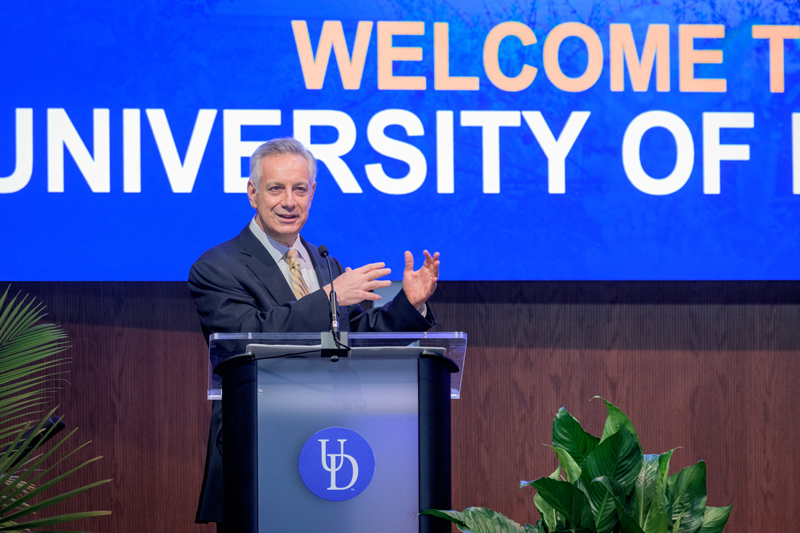
The EU comes to UD
Photos by Kathy F. Atkinson and Evan Krape October 20, 2021
European Union ambassadors make joint visit to Delaware
The mission of the University of Delaware traverses oceans and transcends borders, with the nation’s first study abroad program launched almost a century ago and groundbreaking research with a global impact.
So it makes sense that, on Monday, Oct. 18, UD hosted 11 diplomats and ambassadors of the 27-member European Union (EU) on their joint visit to the First State. On both the Lewes and Newark campuses, state and world leaders engaged in robust conversations about the significance of transatlantic partnerships for Delaware and the United States — especially in the midst of a pandemic. The meeting came on the heels of President Joe Biden, a UD alumnus, reaffirming his support for the EU and urging cooperation with the organization.
In a world rocked by COVID-19, a rapidly changing climate and seemingly insurmountable political division, the task of strengthening these relationships may have read as implausible, if not for the faith of University administrators and their honored guests.
“I believe that those of us who work in higher education share at least one trait with those who work in diplomacy, and that is a relentless optimism about the future,” said UD President Dennis Assanis. “We simply couldn’t do our work if we didn’t have hope for a better world.”
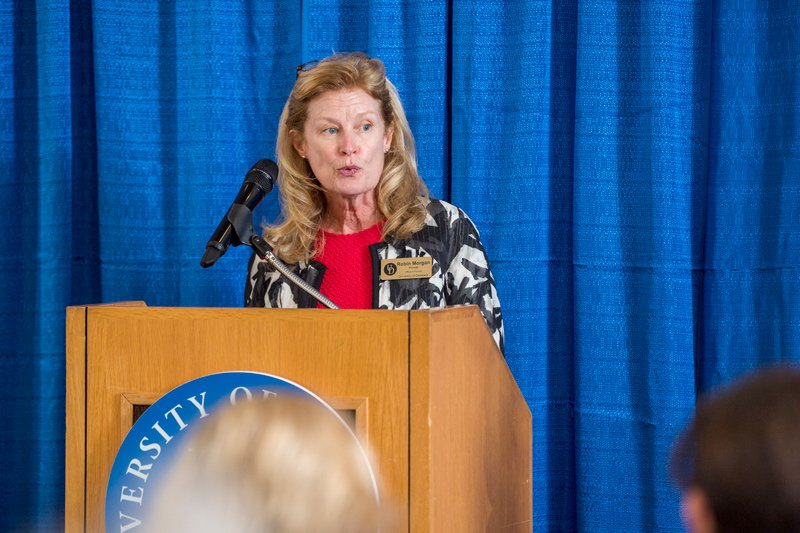
But hope cannot exist without persistent, powerful action — and this is where UD continues to excel and inspire.
“As an institution, the University of Delaware is committed to addressing the critical needs of the state, the nation, and the global community, in partnership with public, private and nonprofit institutions in Delaware and beyond,” Provost Robin Morgan said in welcoming the ambassadors to the event in Lewes. “I hope that during your visit, you will see clear evidence of this, and that we can identify and embrace opportunities for future partnerships.”
The role of higher education
What is so scary about smart girls?
This was a question posed by Stavros Lambrinidis, EU ambassador to the U.S. during a discussion on UD’s Science, Technology and Advanced Research (STAR) Campus about the role of higher education in transatlantic partnerships. He cited the Taliban shooting of Malala Yousafzai as she made her way to school in Pakistan, the Boko Haram kidnapping of nearly 300 schoolgirls in Nigeria and the ISIS abduction of hundreds of Yazidi girls in Iraq.
“Smart girls become educated girls, and educated girls become empowered women, and empowered women change entirely the balance of power in any society, and the last thing that a terrorist wants is empowered societies — they want societies with big black holes of power that they can fill in with their hatred,” Lambrinidis said. “So if you want to fight terrorism, educate girls and boys.”
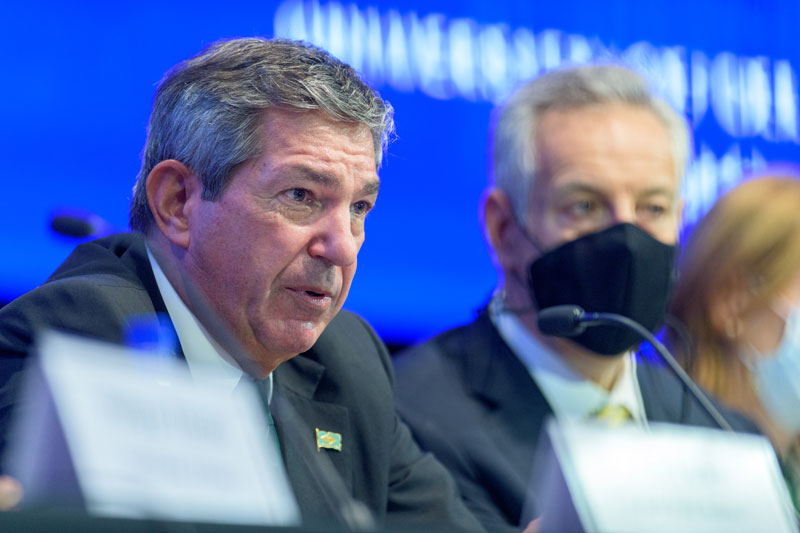
Increasing educational access at home and abroad is not merely “kumbaya” speak, Lambrinidis said — it is, rather, how we address some of the greatest challenges facing humanity in the 21st century, from political violence to climate change to the proliferation of misinformation on digital platforms.
Higher education programming — like that offered at UD — “exposes students to the knowledge that disparities exist in the world and that they themselves are part of this unequal system,” Assanis said, pointing to gaps in income, technology, natural resources, and access to healthcare, medicine and healthy food. “When our students are aware of the inequality around them, they feel compelled to act.”
Or, as Irish diplomat Daniel Mulhall, the first member of his family to attend college, put it: “There is nothing more important than to understand each other, and that is what education does.” Research and student exchange partnerships between countries are, therefore, crucial, because “no country and no region of the world has a monopoly on wisdom, and if there is such a thing as wisdom, it can probably only be found by us working together.”
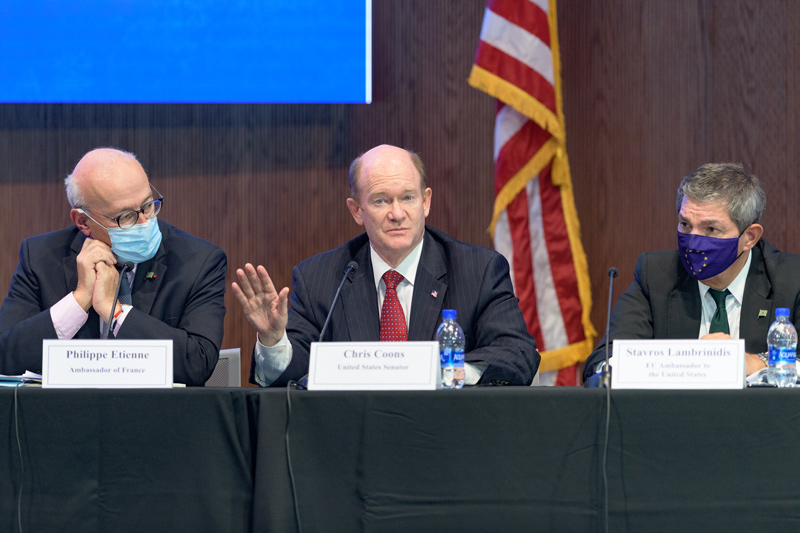
U.S. Sen. Chris Coons of Delaware offered himself as an example, explaining that his own study abroad experience as a college student in Nairobi set him on a path toward a lifetime of engagement with the continent of Africa, working to build mutually beneficial partnerships in the areas of trade, governance and security.
“Time spent studying and working with people from other parts and places in the world is a key part of the educational mission at UD, something we need to celebrate, something we need to work hard to deepen and something we need to sustain,” Coons said.
On the one hand, the pandemic has made this need for collaboration in solving the world’s problems even more clear, as “it has taught us the value and importance of who we are — one world and one community,” said Delaware Lt. Gov. Bethany Hall-Long, who is also a professor of nursing at UD.
But there are significant challenges to this collaboration.
“I have seen in Europe and the U.S. even educated people entirely capable of hating each other, entirely happy to be misinformed,” Lambrinidis said. “Universities in my day did a great job in teaching me how to discover truth, how to research it, but today I feel we need to do a better job of getting people to want to discover the truth.”
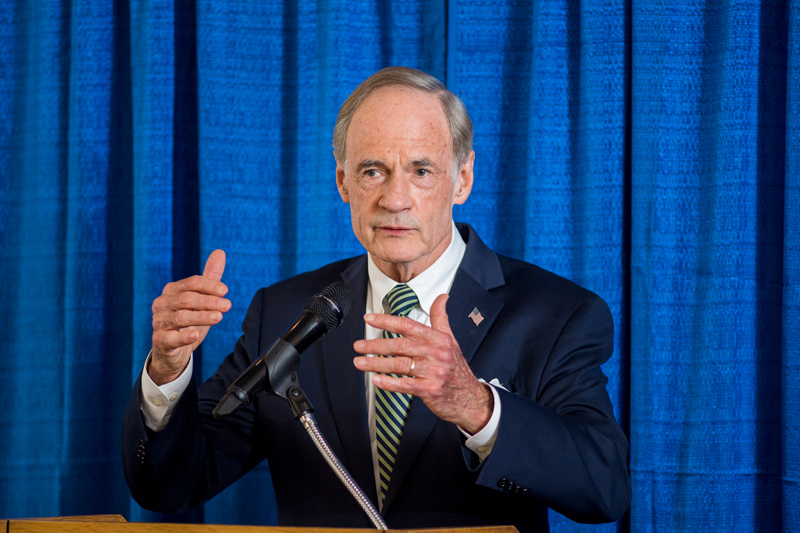
According to German Ambassador Emily Haber, this effort begins with acknowledging the reservoir of people who do not feel as though they have access to empowerment offered by the “great educational project,” and with finding ways to bring these people into the fold. It is also essential to create an environment that allows for the free exchange of ideas in an atmosphere of respect, something UD is pursuing via the Ithaca Initiative, a new civil discourse program guided by the Joseph R. Biden, Jr. School of Public Policy and Administration.
It is commitment such as this from UD and other major players at home and abroad that will allow for the forging of fruitful international partnerships long into the 21st century.
“American universities are places where the future of the world is being investigated but also being shaped,” said French Ambassador Philippe Etienne. “They are essential places for our democracies.”
Creating a more sustainable supply chain
The world is short of, well, everything.
Since the onset of the COVID-19 pandemic, an inability to easily secure the goods we rely on has resulted in global supply chain issues, and fixing them will be key to ensuring the health of countries — their people and their economies — around the world.
To discuss the best path forward, government officials from near and far as well as representatives from the private and public sectors came together at the STAR Audion for what moderator Charles G. Riordan, vice president for research, scholarship and innovation at UD, called a “rich and forward-looking” conversation.
Claire DeMatteis, UD alumna and special assistant to Delaware Gov. John Carney (also a UD alumnus), offered a breakdown of how the state has spent pandemic relief funds, which amounted to $3 billion, or approximately half the state’s yearly budget. A third went to unemployment aid, a third went to COVID-19 mitigation efforts and a third to nonprofits, small businesses, hospitals and childcare facilities.
“This governor has been very consistent and our president has been very consistent on advancing initiatives that improve our quality of life, our education and helping those most in need,” DeMatteis said.
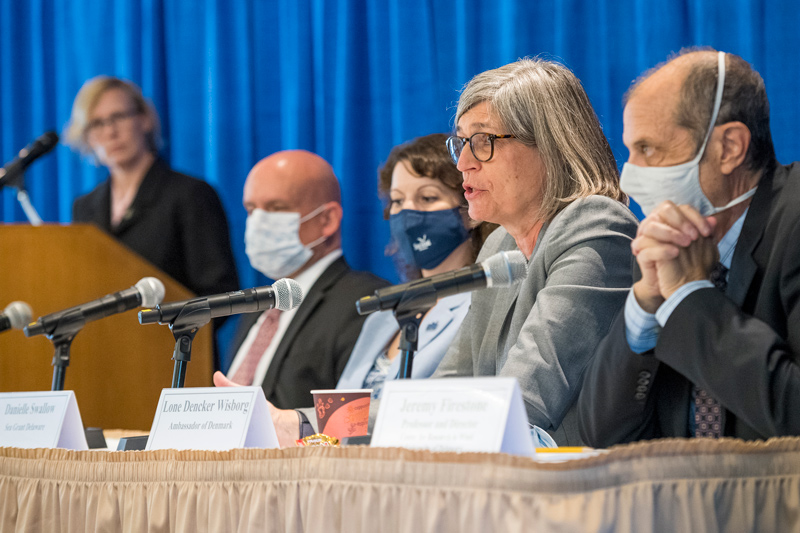
Throughout the conversation, a common denominator emerged: When it comes to correcting the supply chain and safeguarding it against future disruptions, international cooperation will be key.
Kelvin Lee, Gore Professor of Chemical and Biomolecular Engineering at UD, knows a thing or two about this topic. As director of the National Institute for Innovation in Manufacturing Biopharmaceuticals (NIIMBL), which is headquartered at UD, he brings together a global ecosystem of vendors, suppliers, drug manufacturers, small businesses, private foundations and nongovernmental organizations to improve patient access to lifesaving medications.
“A hallmark of today’s ecosystem is that science and innovation are pursued regardless of national borders, regardless of language, regardless of currency,” Lee said. “And thank goodness for that — the available COVID treatments and vaccines were developed and manufactured through this international ecosystem.”
Attesting to this was Albert Bourla, CEO of Pfizer Inc. The coronavirus vaccine his company developed in conjunction with BioNTech requires more than 280 materials from 86 suppliers in 19 countries. To defeat the virus, he said, “we must be united, and I can think of no better example of this unity than the strong relationship I have enjoyed with my friend, Ugur Sahin, the CEO of BioNTech. There is no reason that a Jew from Greece and a Muslim from Turkey cannot work together. And there are more than 7.7 billion reasons we need to.”
Nations and jurisdictions that have maintained or expanded economic growth even in the midst of a pandemic have relied on such cooperation. Take Ireland, a heavy exporter of pharmaceuticals and medical technologies. According to Ambassador Mulhall, “our supply chains have been so strong over the last year and a half that actually, last year, our economy grew by about 2%. We were the only economy in the Western world that managed to grow… which demonstrates that Ireland is a perfectly reliable part of the U.S. supply chain.”
Likewise, New Castle County Executive Matt Meyer shared a success story related to the power of idea sharing.
“Before COVID came to our shores, we were monitoring what other jurisdictions were doing, and we saw that France was monitoring their sewers for COVID-19,” he said. “Because of that work in Europe, we became one of the first jurisdictions in the U.S. to do that, and that gave us an early head start on identifying this deadly, invisible virus in our community.”
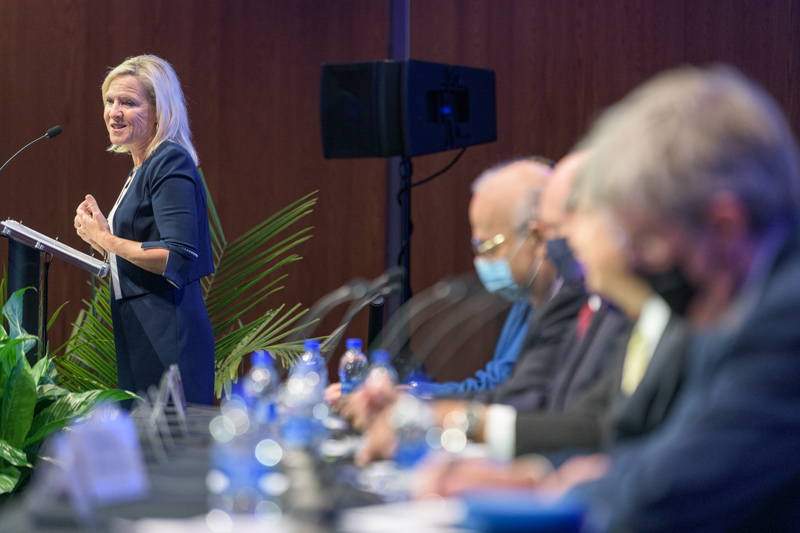
Italian Ambassador Mariangela Zappia added that collaboration between the EU and the U.S. needs to be even more “lively and strengthened,” and this type of collaboration is easiest and most fruitful when participating nations share values: “It is probably the most relevant thing,” she said.
While all participants agreed the future is unpredictable, one thing is certain: The lessons learned during the COVID-19 pandemic — about the supply chain and beyond — will help better prepare the world for future emergencies.
“There are a lot of challenges ahead,” said Lithuanian diplomat Audra Plepyte. “But I think we are on a very good path.”
Combating climate change
A conversation about climate change and its consequences, such as rising sea levels, takes on added urgency when the discussion happens in the lowest lying state in the country. That was noted by several speakers at the Virden Center in Lewes, site of the panel discussion called “Climate Action and Resilience: The Case for Transatlantic Collaboration.”
Provost Robin Morgan kicked off the discussion, introducing speakers such as U.S. Sen. Tom Carper, Delaware Department of Natural Resources and Environmental Control Secretary Shawn Garvin, Lewes Mayor Ted Becker and Steven Friend of Friends Clams and Oyster LLC. She also welcomed EU Ambassadors Pjer Šimunović (Croatia), Marios Lysiotis (Cyprus), Lone Dencker Wisborg (Denmark) and Domingos Fezas Vital (Portugal), along with participating UD faculty members Willett Kempton, A.R. Siders, Danielle Swallow and Jeremy Firestone.
Dana Veron, associate professor and director of the Gerard J. Mangone Climate Change Science and Policy Hub, moderated the panel discussion among the ambassadors and UD faculty. Ambassadors Šimunović, Lysiotis and Fezas spoke to the existential threat climate change poses to their countries and the work they have been doing to build international partnerships to address what they termed a security threat. Wisborg noted Denmark started transitioning to the green economy and made a significant investment in wind in the early 1970s as a matter of ensuring her country’s energy security in response to the oil crisis. She said the amount of job growth in the green sector has been four to five times that of the regular economy, while noting that every one gigawatt of added wind energy capacity leads to the creation of 15,000 new jobs.
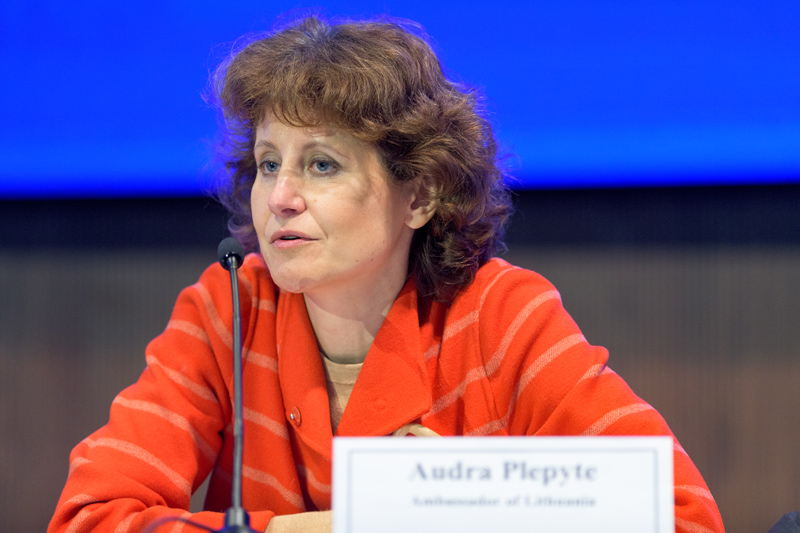
Kempton highlighted plans by the Northeast states to have 32 gigawatts of new wind capacity in the next 10 years, a goal that will require having an additional 45,000 workers and managers for the offshore wind sector. UD’s Center for Research in Wind (CReW) is working on that problem, while Kempton has done extensive research around the necessary establishment of marshalling ports, which are large waterside facilities where wind turbines are assembled before being shipped out into the ocean.
The work of identifying community needs in terms of planning for climate change is something Swallow has been working on with UD’s Coastal Resilience Design Studio. She spoke of the Studio’s efforts to send students into local communities to give officials the design and engineering support they need for projects aimed at addressing the climate impact they are already seeing.
Siders spoke of the big-picture work necessary to help communities adapt to the effects of climate change. She said the challenge is how we will manage that change and getting stakeholders to examine the question of what we want our community, our state and our nation to look like in 30 to 100 years. It is often a matter of facilitating difficult conversations, examining what we want to save, what we are trying to preserve and what are the trade-offs for all of the people in our communities.
UD's Firestone summed up the discussion when he referenced Swedish teenage environmentalist Greta Thunberg.
“I have a sign on my desk that says, ‘What would Greta do?’ ” Firestone said. “What can each of us do as individuals and collectively to address climate change? This meeting today is one reminder of that. And let’s implement the Paris Accords and do it quickly.”
Contact Us
Have a UDaily story idea?
Contact us at ocm@udel.edu
Members of the press
Contact us at 302-831-NEWS or visit the Media Relations website

